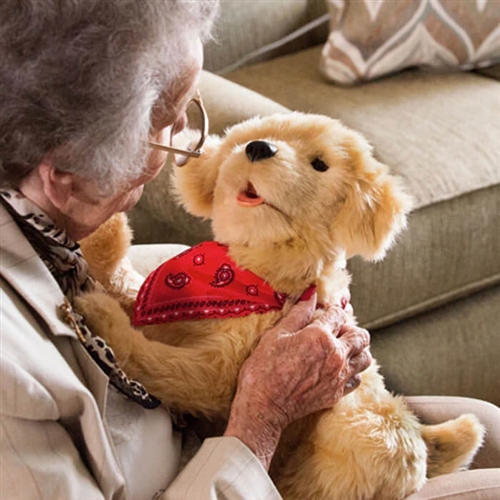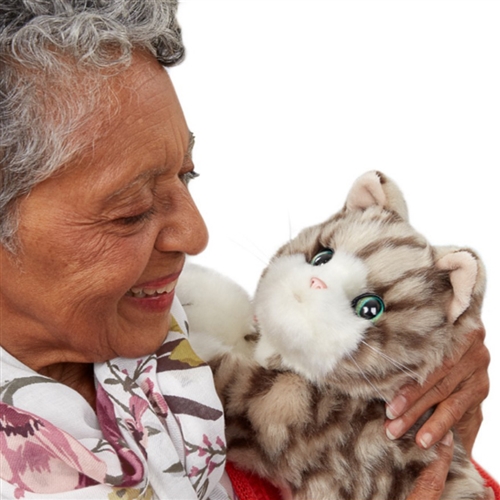
Robot dogs are becoming more popular in dementia care as robotics manufacturers learn how to capitalize on our love of actual dogs.
Credit: The Alzheimer’s Store
This holiday season, we can buy more robot toys than ever before — robots for the whole family, from kids to young-at-heart adults. Robot pets, from robotic cats that vibrate while purring to a whole pack of tail-wagging electronic dogs, have become a popular way to entertain ourselves and make life with a “pet” feel easier. Robots are also being used as a tool in dementia care, in an attempt to provide relief for patients, families and healthcare providers. From family caregivers to sociologists to the State of New York, stakeholders are exploring the benefits and costs of robot pets for older adults with dementia.
As a society, we’ve been playing with sophisticated robot toys for decades. SevenPonds first wrote about robot pets for seniors back in 2015. But the COVID-19 pandemic has quickly increased how much we’re using robot pets for dementia care as we broadly explore how technology might support and comfort our loved ones most impacted by social distancing. The loneliness and isolation that often come with a dementia diagnosis are risk factors for worsening health and death, and social distancing has made it even harder for older adults with dementia to maintain relationships with family and friends. Advanced age is a risk factor for severe cases of COVID-19, and nursing homes and other care facilities have placed significant restrictions on visitors. Healthcare workers wear masks, face shields, and gloves to limit the spread of COVID-19, so older adults with dementia now also suffer from not being able to see their caregivers’ faces, hear their voices clearly, or feel their touch.

Healthcare workers wear masks, gowns and goggles to protect older patients from COVID-19. Patients suffer from that lack of human connection — but a robot pet can’t transmit the coronavirus and may offer patients some emotional relief.
Families and healthcare facilities alike are exploring the value of robot pets for older adults with dementia. Robots don’t transmit the coronavirus, and your older family member can interact with PARO the baby seal or Aibo the adorable puppy without the risk of becoming severely ill with COVID-19. For some people with dementia, robot toys provide the emotional stimulation they crave — something that responds when they touch it and talk to it, whenever they want. Unlike families overwhelmed by busy schedules or healthcare workers caring for many patients at once, a robot can be available at any time of day for as long as the person wants. Even when we’re not living through a global pandemic, that can be a big relief for everyone.
A Growing Desire for More Robot Pets for Older Adults
Healthcare workers in nursing homes and other care facilities are often stretched thin, and so those facilities are using robot pets and human-like robots such as PARO or My Real Baby dolls to try to provide social and emotional care for people living with dementia. These “social robots” play a different role for patients than the one played by robots designed to help with physical care, such as getting in and out of a wheelchair or bathing. Robot pets for older adults are intended to provide the emotional pleasure of playing with a dog or the tactile comfort of petting a purring cat. Seniors living with dementia may reenact enjoyable memories of caring for their own newborn children by interacting with a robotic baby doll. Robot toys don’t address the core reasons why our daily schedules are too full or healthcare system is overburdened, but they can provide some immediate relief to people living with the challenges of dementia.

Dr. Sherry Turkle is an expert on our evolving social relationship with robotics. She says robots are useful tools but relying on them to be companions is
“playing with fire.”
Credit: MIT Spectrum
As with everything in life, there are few (or no) easy solutions to the complex problems of dementia care. In September of this year, Sigal Samuel reported for Vox on how using social robots to help care for our aging family members could have serious negative consequences, ranging from violating privacy to eroding caregivers’ moral character. And researchers have known for years that not all people living with dementia respond positively to robot pets. In 2006, Dr. Sherry Turkle and her team at MIT studied how residents in a nursing home interact with robot toys. The researchers found some residents were uncomfortable feeling strong emotions about a lifelike robot. And even positive responses can be complicated. Some residents who treated the robots as fully alive reported feeling comfort when they interacted with the toys, but Turkle wondered how soothing a robot can really be if it doesn’t also experience pain, sadness or death the way humans do.

Online retailers like The Alzheimer’s Store offer a variety of robot toys for older adults living with dementia.
Credit: The Alzheimer’s Store
Robots Aren’t “Good” or “Bad” — It’s How We Use Them
But little (or nothing) in life is simply good or bad, including robot pets for older adults living with dementia. In the same Vox article, Shannon Vallor at the University of Edinburgh acknowledges robots may ease real burdens on caregivers who are in danger of becoming “burned out, bitter, and possibly less empathetic” due to the demands of dementia care. However, “if a robot gives us [more resources to feel empathy and reciprocity] by making caregiving more sustainable, that’s a win.”
Robots are already everywhere in our lives, whether we’re young or young-at-heart, and the COVID-19 pandemic has accelerated our reliance on technology at a time when more older adults live with dementia than ever before. But we can make some choices about how we use robots in dementia care. As Turkle told The Guardian in 2015, “‘If people start to buy the idea that machines are great companions for the elderly or for children, as they increasingly seem to do, we are really playing with fire. I think the stakes are very high.’” But we may not need to dispense entirely with robot pets for seniors with dementia. Turkle is hopeful we can make good choices that utilize technology while protecting ourselves and our loved ones from harm. As she told The Guardian, “I am not planning to give up my phone. I just need to know what it is good for.”
So, should you buy a robot pet for your older family member living with dementia? As with so many other end-of-life decisions, the answer is complicated. Our relationship with robots is always changing, and every family is in a different situation. Every person experiences their dementia diagnosis differently. Robots can be helpful, harmful, or both at the same time. Before you buy a robot pet for an older adult with dementia, whether it’s a wiry but cute dog or a whimsical creature like a Furby, read about these robots and consider the costs and benefits. Then do your best to decide what will help you and your older family member most.

 Do Robot Pets for Older Adults with Dementia Help Ease Loneliness?
Do Robot Pets for Older Adults with Dementia Help Ease Loneliness?



 “As Tears Go By” by Marianne Faithfull
“As Tears Go By” by Marianne Faithfull
 “The Sea” by John Banville
“The Sea” by John Banville














